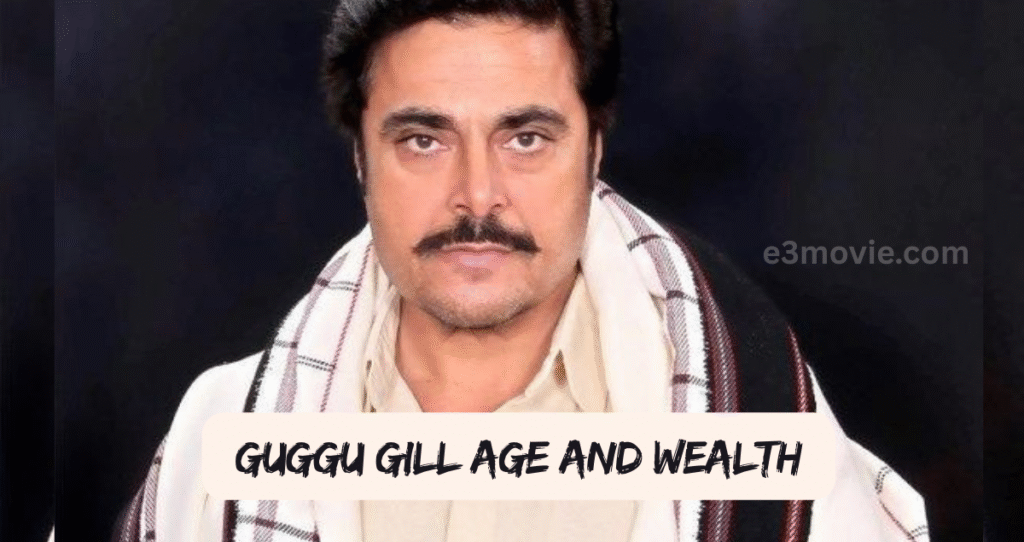
Early Life & Background
Guggu Gill, born Kulwinder Singh Gill, grew up in rural Punjab, which shaped much of his on-screen identity. His earthy looks, rustic dialogue delivery, and commanding presence made him a natural fit for Punjabi action dramas of the late ’80s and ’90s. Coming from a farming family, he understood the cultural nuances of Punjab’s villages, and that authenticity translated into his characters—whether a rebellious Jatt, a wronged villager, or a fiery antagonist.
Dominance in the 1990s
The 1990s were the golden period of Guggu Gill’s career. Punjabi cinema was heavily dominated by action-dramas, and he quickly became the go-to face for lead roles. Films like Jatt Jeona Morh (1991) and Badla Jatti Da (1991) turned into massive blockbusters, cementing him as a superstar. He was often compared to Bollywood’s action heroes of that era because of his larger-than-life portrayals and mass appeal. For many Punjabi moviegoers, he was the ultimate screen hero—raw, powerful, and rooted.
Who Is Guggu Gill?
Kulwinder Singh Gill, better known by his screen name Guggu Gill, was born on 14 January 1960 in Mahni Khera (also noted as Ghall Khurd), in Punjab, India(Wikipedia, StarsUnfolded, BookMyShow). Over a career that spans more than four decades, he’s become one of the most dependable and widely recognized faces in Punjabi cinema.
Early Steps and Rise to Fame
- Debut: He started in a minor role—fighting a dog—in the blockbuster Putt Jattan De (1983), though some sources suggest the film released in 1981(Wikipedia, StarsUnfolded, BookMyShow).
- Breakthrough: His significant break came in 1986 when he played a menacing villain in Gabhroo Punjab Da, earning him a Best Villain award and setting the stage for lead roles(BookMyShow).
Career Highlights & Collaborations
Guggu Gill embraced both heroic and villainous roles with equal flair. He starred in classics like Jatt Jeona Morh (1991), Badla Jatti Da (1991), Anakh Jattan Di (1990), and Mirza Jatt (1993)(IMDb, Wikipedia, BookMyShow, The Times of India). He often shared the screen with big names like Yograj Singh, Dharmendra, Raj Babbar, Gurdas Maan, Upasana Singh, Priti Sapru, Manjeet Kullar, and Ravinder Maan(Wikipedia, StarsUnfolded, BookMyShow).
Recognition & Awards
In 2013, the PTC Punjabi Film Awards honored him with a Lifetime Achievement Award, recognizing his enduring contributions to Punjabi cinema(Wikipedia, BookMyShow).
Personal Life Snapshot
- He has two sons: Guramrit Singh Gill (noted as one of Punjab’s youngest village Sarpanches) and Gurjot Singh Gill(StarsUnfolded, BookMyShow).
- He hails from a film-connected Gill family known for other regional hits like Aankh Jattan Di, Dil Da Mamla, Vidroh, and Putt Jattan De(BookMyShow).
- Some profiles also share detail on his physical stats—about 1.78 m tall and 85 kg—but those specifics often come from entertainment sites and should be taken with a pinch of salt(StarsUnfolded).
Recent Work (2015 and Beyond)
Guggu Gill continues to be active. Here’s a quick look at some notable works:
- Shareek (2015) – musical drama(Wikipedia)
- Dildariyaan (2015)
- Sardar Saab (2017) starring alongside Jackie Shroff and Juhi Chawla(BookMyShow)
- Bhajjo Veero Ve (2018) – culturally rooted romantic comedy where his performance earned praise(Wikipedia)
- Saade Aale (2022) – sports drama(Wikipedia)
- Oye Makhna (2022) – romantic comedy with Ammy Virk and Tania(Wikipedia)
- Majhail (2025) – an action film where he plays a supporting role(Wikipedia)
He also appears in other recent titles like Nishana, Jaggo Aayi Aa, Majhail (2025), Teri Meri Gal Ban Gayi, Bajre Da Sitta, and Saade Aale(BookMyShow, The Times of India).
Why It Matters
- Versatility: Whether hero or villain, Guggu Gill brings depth and command to his roles.
- Longevity: Staying relevant from the 1980s to today, he’s proven adaptable and audience-friendly.
- Cultural Influence: He helped define Punjabi cinema’s identity during its boom years in the ’90s.
- Recognition: Institutional honors like the Lifetime Achievement Award confirm his impact.
Quick Summary Table
| Detail | Info |
|---|---|
| Birth Name | Kulwinder Singh Gill |
| Screen Name | Guggu Gill |
| Born | 14 January 1960, Punjab, India |
| Debut | Putt Jattan De (early ’80s) |
| Breakthrough | Gabhroo Punjab Da (1986) |
| Notable Films | Jatt Jeona Morh, Badla Jatti Da, Shareek, Oye Makhna, Majhail |
| Award | Lifetime Achievement – PTC Punjabi (2013) |
| Family | Two sons, Guramrit (Sarpanch) and Gurjot |
Transition & Versatility
While initially typecast in action-packed roles, Guggu Gill gradually proved his versatility. He successfully transitioned into character roles, family dramas, and even comedy. Later in his career, he became the “father figure” or “village elder” in Punjabi films, a shift that not only extended his career but also made him more relatable to younger audiences. This adaptability has helped him remain relevant even as Punjabi cinema embraced new genres and global influences.
Legacy in Punjabi Cinema
Few Punjabi actors have enjoyed the kind of longevity and respect Guggu Gill has. His name is often mentioned alongside Yograj Singh and Dharmendra when discussing the titans of Punjabi action cinema. Beyond the box office, he represents a generation of actors who carried Punjabi films through financially tough times in the industry. His commitment to working in regional films—even when Bollywood offered wider fame—has made him a cultural icon in Punjab.
Influence on New Generations
Guggu Gill’s acting style and screen charisma continue to inspire today’s Punjabi actors, including popular stars like Ammy Virk, Gippy Grewal, and Diljit Dosanjh, who often credit veterans like him for laying the foundation. His films are still referenced in Punjabi pop culture, music videos, and even in dialogues of newer films, showing his enduring influence.
👉 Would you like me to add a section on his net worth, lifestyle, and assets (cars, houses, etc.) like I did for some celebrity bios earlier? That could make it more complete and engaging for your readers.

